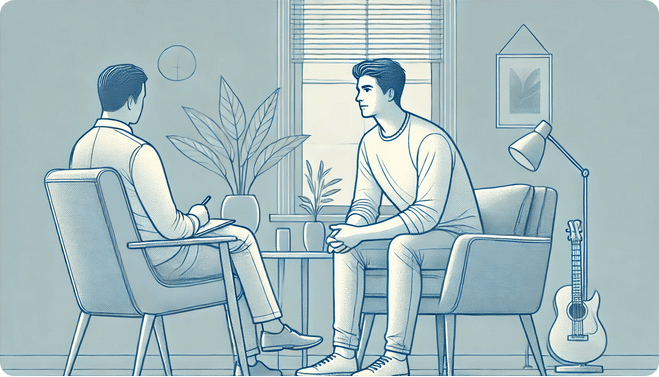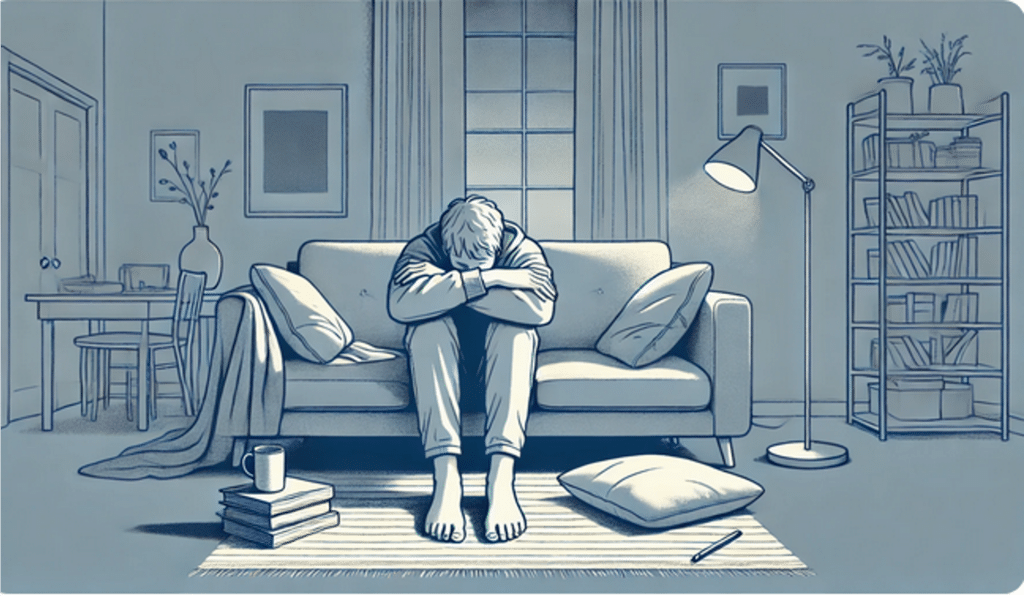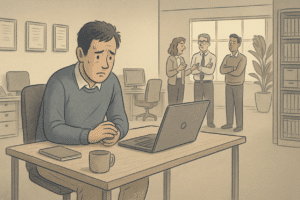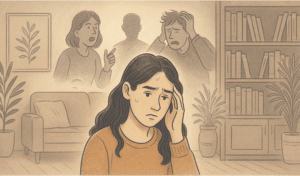Key Takeaways
- Paranoia requires a comprehensive treatment approach combining therapeutic interventions, medication management, and lifestyle modifications.
- Cognitive Behavioral Therapy (CBT) is the most effective therapeutic approach for addressing paranoid thoughts and rebuilding trust.
- Family and couples therapy play a key role in creating a supportive network and improving communication skills.
- Lifestyle modifications, including proper nutrition, mindfulness practices, and quality sleep, significantly support professional treatment outcomes.
- A Mission for Michael (AMFM) provides comprehensive, personalized paranoia treatment, offering integrated care approaches in a supportive, non-judgmental environment.
What Is Paranoia?
Paranoia is a complex mental health condition characterized by intense feelings of suspicion and mistrust that can profoundly disrupt an individual’s daily life and relationships. More than just passing worry, paranoia represents a deeply ingrained pattern of thinking that can isolate individuals and create significant emotional challenges.
The Nature of Paranoid Thinking
Paranoia involves persistent and irrational feelings of persecution or threat, often existing without any substantive evidence. Individuals experiencing paranoia might firmly believe that others are intentionally trying to harm or deceive them, even when no objective proof supports these beliefs. This condition can be associated with various mental health disorders, including schizophrenia and paranoid personality disorder.
What makes paranoia particularly challenging is its deeply rooted nature. These thoughts aren’t merely fleeting concerns but become integrated into an individual’s perception of reality. Convincing someone that their fears are unfounded becomes extremely difficult, underscoring the critical importance of professional intervention and compassionate support.
| A Mission For Michael: Expert Mental Health Care Founded in 2010, A Mission For Michael (AMFM) offers specialized mental health care across Southern California, Washington, and Virginia. Our accredited facilities provide residential and outpatient programs, utilizing evidence-based therapies such as CBT, DBT, and EMDR. Our dedicated team of licensed professionals ensures every client receives the best care possible, supported by accreditations from The Joint Commission and the California Department of Health Care Services. We are committed to safety and personalized treatment plans. Start your recovery journey with AMFM today! |
Comprehensive Treatment Approaches
Understanding Treatment Complexity
Treating paranoia requires a nuanced, multifaceted approach. Mental health professionals recognize that there’s no one-size-fits-all solution, and treatment must carefully consider individual needs. The primary goal is to help individuals manage their symptoms, rebuild trust, and improve their overall quality of life.
Therapeutic Interventions
Cognitive Behavioral Therapy (CBT)
CBT stands as the most effective therapeutic approach for addressing paranoid thoughts. This method focuses on identifying and challenging distorted thought patterns that contribute to paranoid beliefs. Through CBT, individuals learn to:
- Recognize the triggers of their paranoid thoughts
- Examine evidence both supporting and contradicting their beliefs
- Develop healthier, more rational thinking patterns
Therapists might employ techniques such as keeping a thought journal, where individuals document their paranoid experiences and gradually learn to critically analyze them.
Interpersonal Therapy
Interpersonal therapy includes another crucial approach, concentrating on improving communication skills and relationships. This therapeutic method helps individuals understand how their paranoid thoughts impact their interactions with others. Through role-playing and guided communication exercises, patients can develop more trusting and effective relationship strategies.
Family and Couples Therapy
Given paranoia’s significant impact on relationships, family and couples therapy can be invaluable. These sessions provide a structured environment to:
- Improve communication among family members
- Address underlying relationships
- Develop strategies for mutual understanding and support
- Create a supportive network that can help manage paranoid symptoms
Medication Management
While no specific medication treats paranoia directly, pharmaceutical interventions can help manage associated symptoms and co-occurring conditions. Medications are typically used to:
- Reduce anxiety
- Stabilize mood
- Manage symptoms of related mental health conditions
Common medications might include:
- Antipsychotics (such as risperidone or olanzapine)
- Selective Serotonin Reuptake Inhibitors (SSRIs)
- Mood stabilizers
It’s important to note that medication should always be prescribed and monitored by a qualified healthcare professional, with close attention to potential side effects and individual responses.
Natural Support Strategies

A balanced diet and healthy lifestyle choices can support mental well-being and reduce paranoia symptoms.
Lifestyle Modifications
Complementing professional treatment, several lifestyle strategies can support mental health and potentially reduce paranoid thoughts. These strategies are typically used to:
- Stabilize mood and enhance emotional resilience
- Reduce stress and anxiety levels
- Promote overall mental and physical well-being
Key lifestyle adjustments might include:
- A balanced diet with proper hydration to help regulate mood and prevent irritability.
- Mindfulness practices such as meditation to promote relaxation and help individuals stay present.
- Maintaining a consistent sleep schedule for mental resilience and decreasing anxiety.
It’s important to approach lifestyle changes with consistency and patience, as their benefits often accumulate over time, contributing to long-term mental well-being.
Self-Help Strategies
Identifying and Managing Triggers
Understanding personal triggers is essential in managing paranoia. Keeping a detailed journal can help individuals:
- Recognize patterns in their paranoid thoughts
- Identify specific situations that intensify their suspicions
- Develop targeted coping strategies
Building Communication Skills
Developing effective communication skills can help mitigate the impacts of paranoia. This includes:
- Practicing active listening
- Using “I” statements to express feelings
- Seeking clarification instead of making assumptions
- Learning to express concerns constructively
Seeking Professional Help
Professional intervention remains the most effective approach to managing paranoia. When choosing a therapist, look for someone with specific experience in treating paranoid thoughts, who demonstrates empathy, understanding, and patience.
Why Choose A Mission for Michael for Your Paranoia Treatment?

A skilled therapist can help individuals with paranoia build trust and regain control over their thoughts.
At A Mission for Michael (AMFM), we understand that paranoia profoundly impacts an individual, affecting every aspect of their life and experience. Our approach goes beyond traditional treatment methods, offering a compassionate, individualized strategy that recognizes the unique challenges each person faces. We believe in treating the whole person, not just the condition, and we strive to make each client feel heard, understood, and supported throughout their healing journey.
Comprehensive and Integrated Treatment Approach
Our treatment program is designed to address the complex nature of paranoia through a holistic, multi-dimensional approach. We combine evidence-based therapeutic techniques, advanced medical interventions, and supportive counseling to create a comprehensive treatment plan.
Expert Team and Supportive Environment

A safe and structured treatment environment makes a difference in overcoming paranoia.
Our dedicated team of mental health experts brings extensive experience and deep compassion to every treatment plan. Moreover, we create a safe, nonjudgmental environment where individuals can share their thoughts and feelings without fear.
Further, our commitment extends beyond immediate treatment, as we provide ongoing support, resources, and guidance to help clients develop long-term coping skills and build a fulfilling, trust-filled life.
Frequently Asked Questions
What are the main therapeutic approaches for treating paranoia?
The primary treatments include CBT, interpersonal therapy, family and couples therapy, and medication management.
How does medication help in treating paranoia?
While no medication treats paranoia directly, various medications like antipsychotics, SSRIs, and mood stabilizers can help manage associated symptoms and co-occurring conditions.
What lifestyle changes can support paranoia treatment?
A combination of proper nutrition, mindfulness practices, quality sleep, and regular exercise can complement professional treatment and help manage paranoid thoughts.
What self-help strategies are effective for managing paranoia?
Keeping a detailed journal to identify triggers, practicing active listening, using “I” statements, and developing effective communication skills can help manage paranoid thoughts.
How does A Mission for Michael’s approach to paranoia treatment stand out?
AMFM features a unique combination of evidence-based therapies, personalized treatment plans, and a supportive environment led by experienced mental health professionals, focusing on both immediate symptom management and long-term recovery success.








